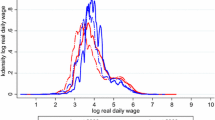Abstract
This study reanalyses data on migrants to Alberta, collected by Statistics Canada in a 1980 Labour Force Survey. The findings indicate that migrant men are gainers and migrant women, particularly migrant wives are the losers from such movement, even during a period of relative economic prosperity in the Province. Women's occupational status tends to improve with time spent in the new labour force. However there is a failure to return to occupational statuses enjoyed before the move. This means, first, that male and female workers are more sex-differentiated after the move than before it; second, that migrant women, especially wives, enjoy fewer occupational returns on their educational investment than migrant men; third, that the balance of economic contribution, and possibly therefore influence, within a migrant household is shifted towards greater male dominance by the move.
It is to be emphasized that each of these findings is to be regarded as tentative pending the completion of further analyses on this and three related data sets. In particular the analysis of household level data will be critical in assessing any hypotheses about family power before and after the move.
Similar content being viewed by others
References
Atkinson, Tom and Murray, Michael: ‘Values, Domains and the Perceived Quality of Life: Canada and the United States’, Institute For Behavioural Research, York University, Toronto, June 1980.
Calzavara, Liviana Mostacci: ‘Social Networks and Access to Job Opportunity’, PhD dissertation, Department of Sociology, University of Toronto, 1982.
Employment and Immigration,Unemployment Insurance in the 1980's Catalogue MP 15-3/2-1981E, Ottawa, 1981.
Economic Council of Canada,Financing Confederation: Today and Tomorrow, Appendix A, 1982.
(a) Economic Council of Canada,In Short Supply: Jobs and Skills in the 1980s, Chapter 7, Ottawa, 1982.
Granovetter, Mark,Getting a Job, Harvard University Press, Cambridge, 1974.
Lamont, G. R. and Proudfoot, V. B.: ‘Migration and Changing Settlement Patterns in Alberta’ in L. A. Konsinski and R. M. Prothero (eds.),People on the Move: Studies on Internal Migration, Methuen, London, 1975.
Malthus, Thomas: ‘An Essay on the Principles of Population as it Affects the Future Improvement of Society’, 1799. See ‘A Summary View of the Principle of Population’, 1830 in Frank W. Notestein (ed.),Three Essays on Population, New American Library of World Literature, New York, 1960.
Marty, Martin E.: ‘Migration: The Moral Framework’ in William H. McNeill and Ruth S. Adams (eds.),Human Migration: Patterns and Policies, American Academy of Arts and Science, 1978.
Nakamara, Aliceet al.:Employment Earnings and Married Females, Statistics Canada, Ottawa, 1979.
Pineo, Peter C. and Porter, John: ‘Occupational Prestige in Canada’,Canadian Review of Sociology and Anthropology 4 (1), 1967, 24–39.
Statistics Canada, ‘Characteristic of Migrants to Alberta and British Columbia: 1976–1980’ Labour Force Survey Research Paper, Number 28, 8-3100-503, Ottawa, March, 1982.
Stone, Leroy O.: ‘Some Theoretical Aspects of the Study of Migration Decisions: A Working Paper’, Statistics Canada and University of Michigan, August, 1982 (mimeo).
Tepperman, Lorne: ‘Musical Chairs: The Occupational Experience of Migrants to Alberta, 1976–80’, University of Toronto, 1983.
Tepperman, Lorne: ‘Patterns of Migration to Alberta in the 1970s: A Re-Analysis of Statistics Canada Data’, University of Toronto, 1982.
Author information
Authors and Affiliations
Additional information
Loma Marsden is Professor of Sociology at the University of Toronto. Her most important publication is: The Fragile Federation: Social Change in Canada(with E. B. Harvey), (McGraw Hill Ryerson, 1979).
Lorne Tepperman is Professor of Sociology at the University of Toronto. His most important publications include Social Mobility in Canada(1975); Crime Control: The Urge Toward Authority(1977); The Roots of Disunity(1979), with David Bell.
Rights and permissions
About this article
Cite this article
Marsden, L.R., Tepperman, L.J. The migrant wife: The worst of all worlds. J Bus Ethics 4, 205–213 (1985). https://doi.org/10.1007/BF00705621
Issue Date:
DOI: https://doi.org/10.1007/BF00705621




